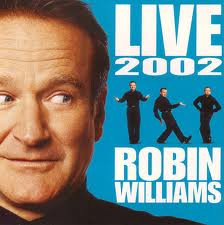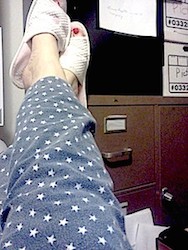 We have all been affected by the suicide of beloved comedian Robin Williams. His was a death that touched us as deeply as his life had. We felt we knew him on a personal level, and though we knew he battled demons, we somehow believed he had survived them, and that all was well at last for him.
We have all been affected by the suicide of beloved comedian Robin Williams. His was a death that touched us as deeply as his life had. We felt we knew him on a personal level, and though we knew he battled demons, we somehow believed he had survived them, and that all was well at last for him.
But if there is one positive thing to come out of this sad end to a beautiful man’s life, it is that people are at last having a dialogue about clinical depression.
This is something I understand on a personal level. My mother suffered from clinical depression, to the point that many times she was incapacitated during my childhood, and my maternal grandmother stepped in to care for our home and for us all. It was the 1960’s and miracle drugs were prescribed right and left–and Mama was on all of them at on time or another with varying degrees of success.
I have fought depression all my life too, and know firsthand that there is no ‘cure,’ no ‘magic bullet,’ no one-size-fits-all pill to solve the problem. Telling yourself to just pull up your socks and get on with your life doesn’t help much either. Because my mother took so many medications, and they often worsened her condition, I have avoided them except at my worst, lowest point.
There is no way to express what clinical depression feels like to a person who has never experienced it. You are not sad–that word is an approximation, but not an accurate description. There is sadness involved, but for me it was more a deep lethargy, a lack of interest in life. I wanted to participate in the world around me, but I couldn’t pull myself together enough to get dressed and go out the door. It was like being stranded at the bottom of a well of confused misery and I loathed myself for that, but there were times in my twenties when I was so paralyzed by this disease, I couldn’t scrape together the energy to clean my house. I had no idea what was wrong with me, or why I was such a failure.
Fortunately I had children. I refused to just stay in bed as my mother did at times. I forced myself to stay involved with them, only booked music gigs for early evening in places like Wolf Haven or coffee shops where I could take my kids, and I wrote short stories, fairy-tales for them. Having to provide a decent life for my children kept me going to work and functioning on a superficial level. For them, I could get up, go to work, and pay the bills, but it was a constant struggle and in the late nineties my third marriage fell apart and once again depression hit me hard.
In 1998 I began having severe panic attacks to the point I was unable to drive across town. I opted to go into therapy, in the hope I could learn ways to cope. Thanks to an extremely caring psychologist who was not afraid to try new ideas, I found the tools and skills I was looking for. He showed me simple ways to physically alter my brain’s chemistry without resorting to medications, and as along as I practice these techniques I do well. For me, this was an answer.
It was not as easy as it sounds, but now I have some way to deal with this. I have sort of gotten a handle on it, and writing is part of my therapy. Interestingly enough, I recently had the indignity of being denied affordable life insurance because of this diagnosis being in my medical record.
The Journal of Psychiatric Research recently published a study, “Mental Illness, Suicide, And Creativity: 40-Year Prospective Total Population Study,” examined 1.2 million Swedish patients from the country’s national registry and compared this sample against the entire Swedish population. The most interesting and surprising results related to authors. Writers were a whopping 121% more likely to suffer from bipolar disorder than the general population. Moreover, Simon Kyaga, the study’s lead researcher, said that authors had a “statistically significant increase” in anxiety disorders: 38% to be exact. Rates of alcoholism, drug addiction, and suicide also increased among writers.
Go figure.
In an interview on the website, Lit Reactor, Portland Oregon based author and psychotherapist, Philip Kenney, said: “It isn’t easy to see oneself, the strengths and weaknesses, the familiar imperfections, without a judgment that often spells, B-A-D. Inferior. I try to remember the beautiful patterns made by the cracks in the sidewalk. Practicing kindness is the best remedy.”
 That is also my motto. Practicing kindness, forcing myself to be involved with life outside of my front door and pushing myself out the door to work in a coffee shop is an antidote for me.
That is also my motto. Practicing kindness, forcing myself to be involved with life outside of my front door and pushing myself out the door to work in a coffee shop is an antidote for me.
I admit I am obsessive about my craft, and that has been both a curse and a boon. It is a curse, because if I choose, I can use it as a reason to never go anywhere. But it is a boon because through my involvement with NaNoWriMo, Olympia Area Writers Co-op, PNWA, and ABNA I am FORCED to leave the Room of Shame (my office) and through these organizations I have met some of the most wonderful, amazing people you can imagine.
And strangely enough–many of them frequently suffer from various forms of ill health, depression, and anxiety disorders. By staying involved, we raise each other up, and try to support each other when the road is hard.
I am grateful for my blessings, never more so than when someone like Robin Williams, who gave us so much of himself, falls victim to the demons of evil, pernicious, clinical depression.








I too suffer with bipolar 1 and anxiety disorder. Fortunately we have insurance. My husband is bipolar also. Our co-pays and deductible just keep getting bigger. Don’t know what we will do when he retires. Medicare?
LikeLike
@sknicholls – It is a curse, but it feeds our creativity. I frequently wonder those things, too.
LikeLike
Over the years, I’ve known so many creatives with either depression or bipolar that they almost outnumber those without. I’ve also known many who claim to be depressed, but have no understanding of the difference between feeling vaguely unhappy with life and being in a black pit from which there seems no escape.
One of my friends, Dave Halliday, the singer with the British HM band ‘Hell’ killed himself when a record deal didn’t work out – the company went bust. His songwriting talents and guitar skills were exemplary and his stage presence awesome, but off stage he was a different person. Like Robbie Williams he kept his show for the public, but in private the darkness was always there, bloody well waiting.
LikeLike
@ JD– I am hugging you, from across the pond. It is tough to see it happen.
LikeLike
It’s tougher to not notice where its headed and do something about it. But thanks for the hug, Connie – always appreciated 🙂
LikeLike
Well put! Writers–and all artists–especially suffer from this affliction, both with and separate from their work. I find creating something, when one is not disabled by it, can be the medicine that gets us through. Keeping busy and interacting with someone, anyone (i.e., social media) is a big help; just staying connected to humanity.
I think people were affected more because Robin Williams was a comedian and not subject to “sadness”. But the “clown” has long been the one who cries the most.
Thanks for your post!
LikeLike
@Stephen–you help me see the awkward humor in life and I usually find myself laughing at your posts–thank you for your friendship!
LikeLike
Reblogged this on deborahjay and commented:
In the aftermath of Robin William’s tragic suicide, author Connie Jasperson shares some startling insights and figures on the links between creativity and depression.
LikeLike
Thanks for sharing this, Connie. I’m one of those fortunates that haven’t suffered, but I have many creative friends who battle these problems daily, and any information like this helps to put their predicament into clearer context for me.
I’ve reblogged this post.
LikeLike
Thank you Deborah–I’m glad my story resonates with you, and I hope some can find some help here, or at least consolation.
LikeLike
Reblogged this on Life in Vietnam and commented:
Wanted to share this with you all …
LikeLike